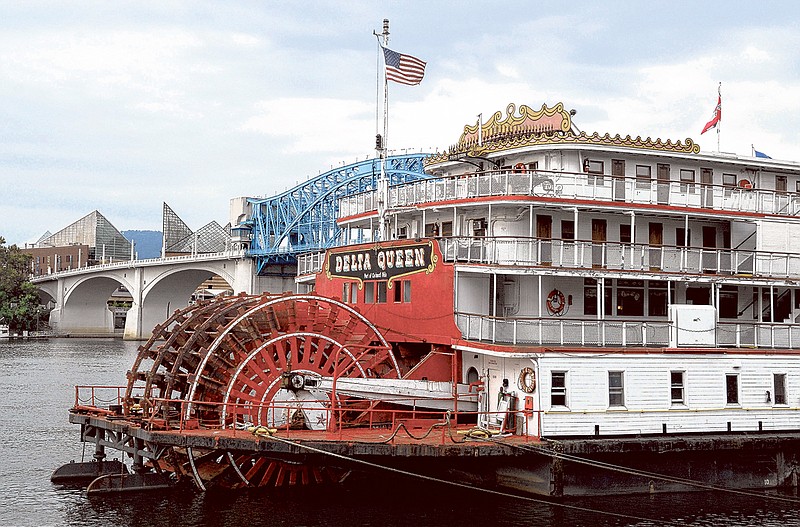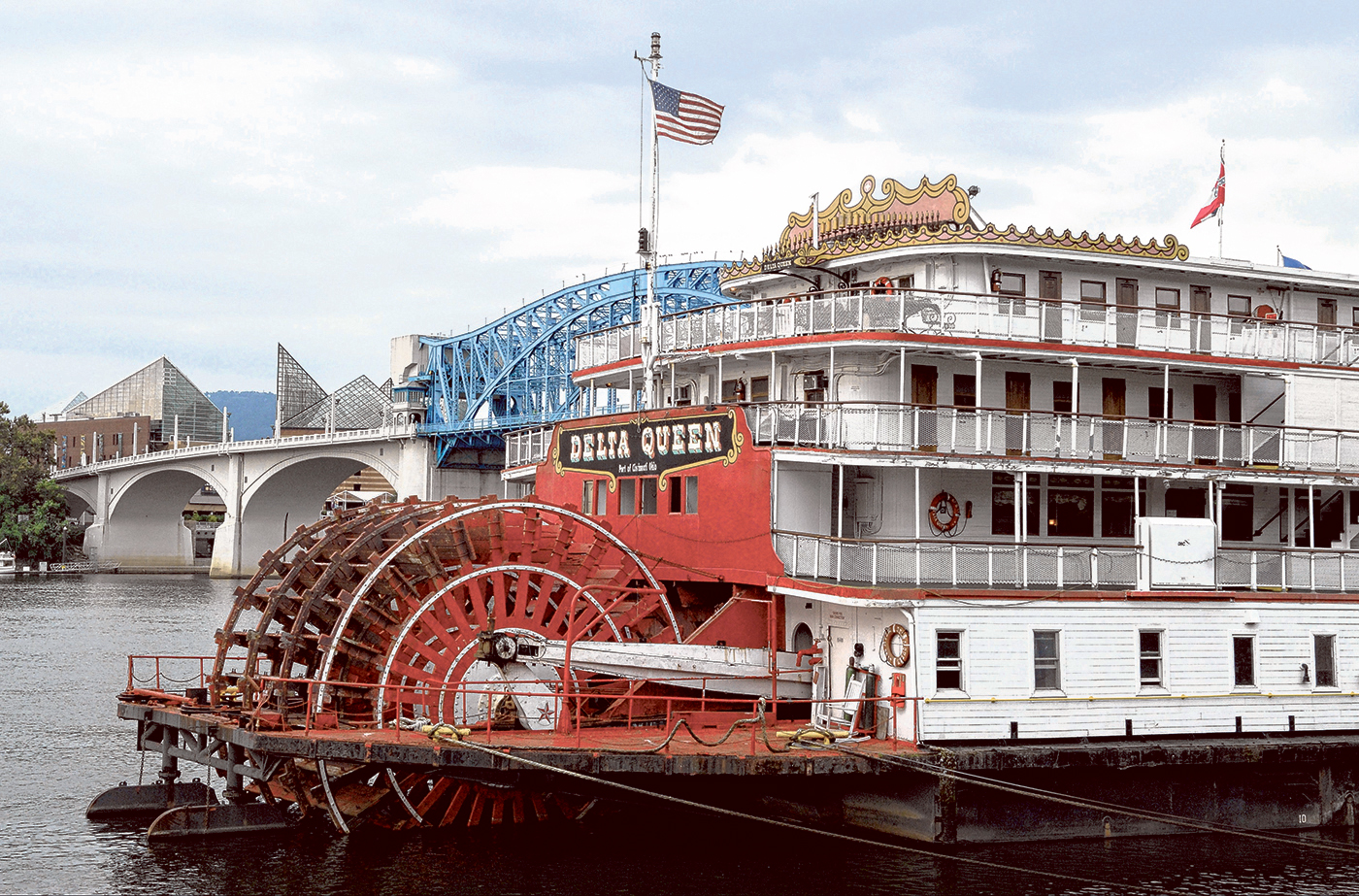The historic Delta Queen riverboat is sold and set to sail in March to Louisiana, where millions of dollars in repairs could ultimately return the storied steamer to America's waterways by 2016.
Delta Queen timeline
* 1924: Construction begins on Delta Queen in Dumbarton, Scotland * May 1927: Delta Queen and sister ship Delta King christened * June 1927: Both boats begin service between Sacramento and the San Joaquin River Delta * October 1940: Delta Queen begins service for the Navy in a variety of roles * June 1945: Delta Queen takes newly created United Nations delegates on tour of New York City * December 1947: Delta Queen bought by Cincinnati businessman for use on the Mississippi River System * 1966: Safety of the Sea law, designed to forbid oceangoing vessels with wooden hulls from carrying overnight passengers, inadvertently affects the Delta Queen * 1970: National Register of Historic Places adds Delta Queen * 1976: Delta Queen bought by Coca-Cola Bottling Co. of New York * 1986: Delta Queen begins sailing out of New Orleans * 1989: Delta Queen designated National Historic Landmark * 2004: Delta Queen inducted into National Maritime Hall of Fame * 2006: Majestic America buys Delta Queen, decides not to renew contract with Seafarers Union * 2007: Exemption to Safety of the Sea Law not renewed, allegedly blocked * 2008: Delta Queen completes last voyage, docks in Chattanooga for use as a hotel and bar * 2013: Chattanooga Mayor Andy Berke attempts to evict Delta Queen * February 2014: An ice storm cripples the Delta Queen, and the boat stops taking visitors * March 2014: Delta Queen's lease with city set to expire but is granted extension * June 2014: A group of investors led by businessman Cornel Martin seals deal to buy boat, return it to duty * December 2014: Two Senate Democrats block a 15-year exemption to Safety of the Sea law that previously sailed through the U.S. House
New Orleans businessman Cornel Martin purchased the Queen from TAC Cruise, a division of Xanterra Holding Corp., for an undisclosed sum Tuesday following years of torturous political and business wranglings that ultimately involved two of the three branches of the federal government, city officials from across the U.S. heartland, and a spirited group of steamboat enthusiasts who refused to let the deal die.
"I guess I bought a boat," said a relieved Martin, president and CEO of the Delta Queen Steamboat Co. "We have a lot of work to do, but the plan is to take her south and begin restoring her."
The Delta Queen landed in Chattanooga when a 2008 squabble over the 1966 Safety of the Sea law -- which forbids oceangoing vessels with wooden hulls from carrying overnight passengers -- dovetailed with a labor union dispute that ensnared the Delta Queen in congressional politics and ultimately left it moored at Coolidge Park, serving as a bar, restaurant and stationary hotel.
The Queen originally began service as an overnight passenger vessel in 1927, carrying passengers between Sacramento, Calif., and San Francisco, and later cruising for decades up and down the Mississippi, Ohio, Tennessee, Cumberland and Arkansas rivers before running aground in political waters.
Martin, who says it will cost up to $7 million to make the Queen ready to set sail, is the leader of a group of investors who have worked for years to purchase, renovate and ultimately legalize the paddle-wheel steamer for river travel. He'll have to replace the World War I-vintage boilers, the steamline, the generators and even the electrical panels to make the boat riverworthy, not to mention upgrades to the hotel facilities and historic wood trim.
"We're planning extensive work," he said.
Martin's move comes at a time when interest in traditional paddle-wheel riverboats has grown in places such as Cincinnati -- where voters recently voted the Queen as the top historic landmark in that city despite the boat being located in Chattanooga -- and as its cousin, the Delta King, rakes in millions of dollars in economic development for Sacramento's coffers.
The Delta Queen is listed on the National Register of Historic Places and is classified as a National Historic Landmark, and was recently designated a National Treasure of the National Trust for Historic Preservation.
While the Queen is coveted in some corners of the U.S. for its Mark Twain-era aesthetic, it outgrew its welcome in Chattanooga. Mayor Andy Berke tried to evict the Queen shortly after he took office in 2013 for nonpayment of rent, a charge disputed by boat manager Leah Ann Ingram.
Bob Doak, CEO of the Chattanooga Convention and Visitors Bureau, said two dozen influential citizens had criticized the boat for "blocking the view" at a location that was never designed to become its permanent home, though dozens of others created "Save the Delta Queen" websites and discussion groups dedicated to preserving the floating landmark.
Whichever community now desires the Queen's berth -- and several have garnered support from politicians on both sides of the aisle -- they'll have to work it out with Martin at the negotiating table.
"I think now that we own the boat, we're going to take a good hard look at the different communities that have expressed interest and make a decision from there," Martin said.
Martin's immediate move is to return to the halls of Congress, where a bill to exempt the boat from the Safety of the Sea law was strangled in December 2014 by U.S. Sens. Richard Blumenthal, D-Conn., and Ben Cardin, D-Md., who used a move called a "hold" to stop a law that had already sailed through the U.S. House.
Lawmakers questioned the safety of the steel-hulled boat's wooden superstructure, though Martin had already agreed to modify the bill to require fire-retardant materials. Martin believes there was more at play than just fire safety, given that the 1966 Safety of the Sea law was never intended to apply to riverboats, only oceangoing vessels.
"We're now the owners of the boat, it's not 'we're going to buy the boat.' Now we're saying, 'We own the boat, we can live up to the commitments we're making,'" he said. "You have to be determined. We're just not there yet."
Contact staff writer Ellis Smith at 423-757-6315 or esmith@timesfreepress.com with tips and documents.

